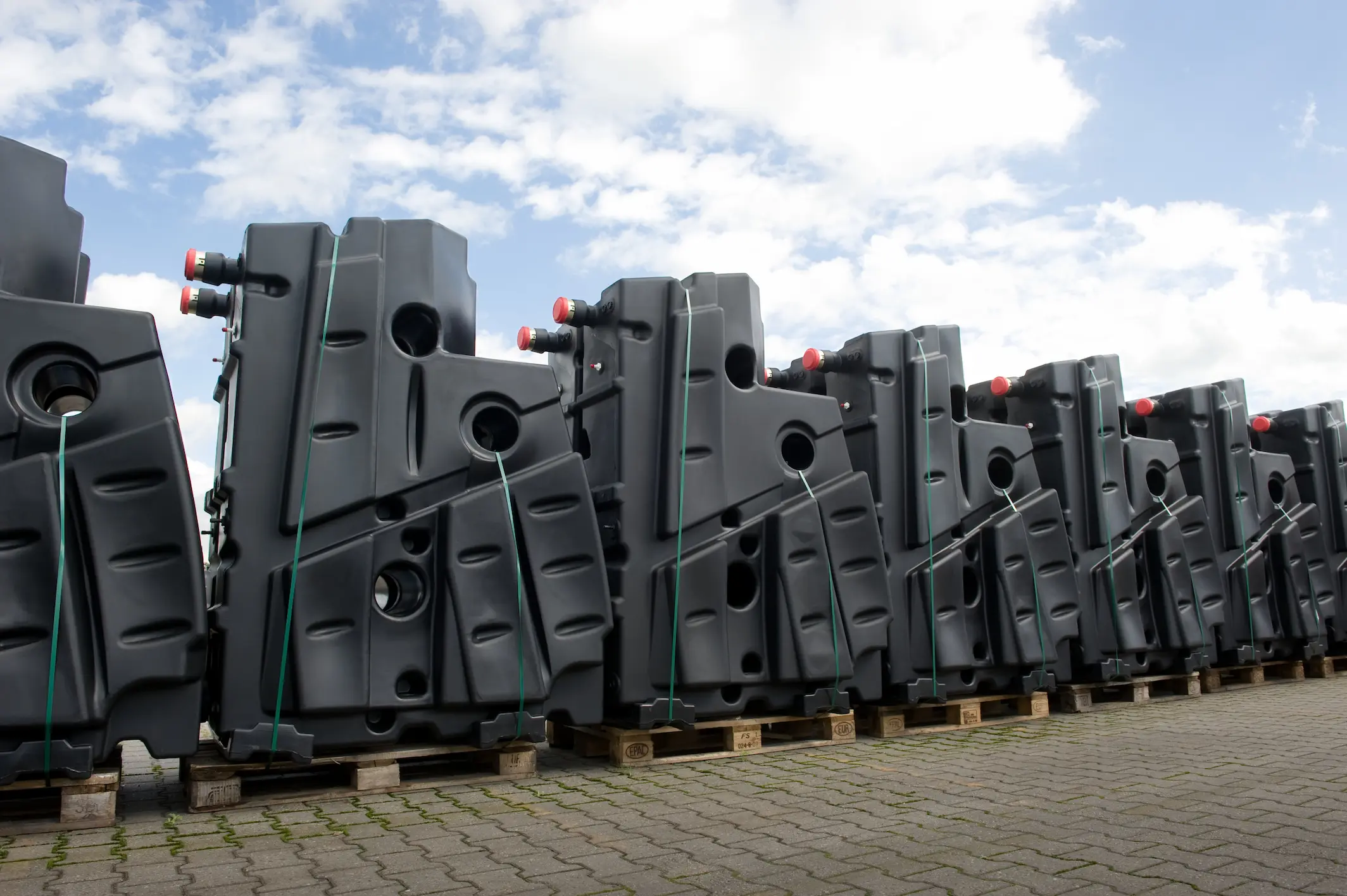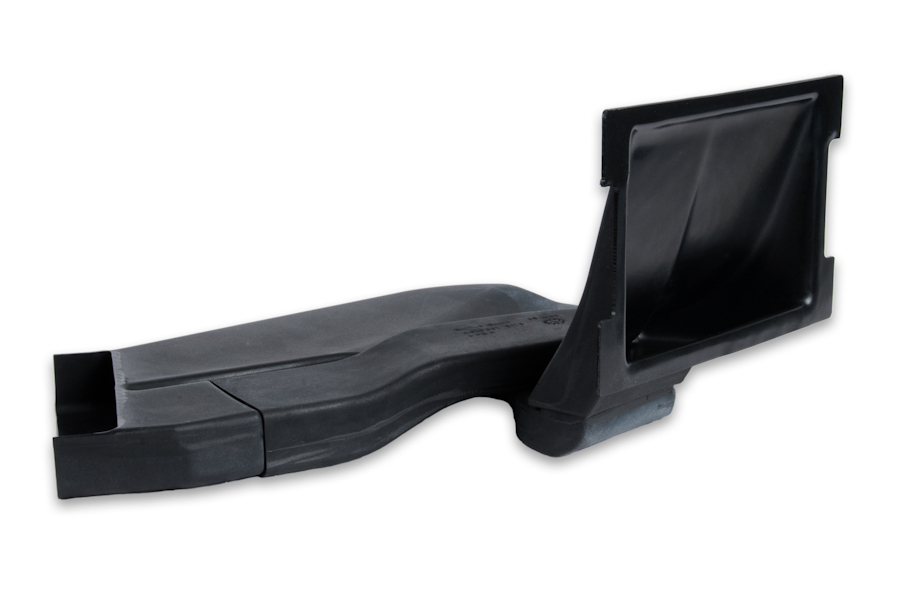Rotational moulding in the transport sector: innovative plastic solutions

The transport sector demands robust, lightweight, and durable products that can be efficiently manufactured. Rotational moulding (rotomoulding) is a plastic manufacturing technique that meets these requirements well. It enables the production of seamless, hollow products by rotating plastic powder in a heated mould so that it evenly hardens against the mould wall. Rotational moulding offers a combination of design freedom and cost efficiency for volumes of several hundred units per year, which other methods struggle to match. From logistic packaging to fuel tanks and from wheel arches to interior parts: rotationally moulded components are used in road transport, logistics, agricultural machinery, railways, and mobility infrastructure.
Table of contents
Technical advantages of rotational moulding
For manufacturing plastic products in the transport sector, rotational moulding offers major benefits. Compared to other techniques, it allows for seamless, hollow shapes formed in a single piece. This eliminates the need for welds, resulting in sturdy and reliable products with consistent wall thickness.
Another key advantage is the low cost of moulds. As the moulds are often made of aluminium, the investment is lower than with other techniques, making rotational moulding attractive for small to medium series. The process is viable from about 300 units per year. As demand grows, multiple moulds can be used simultaneously to increase capacity. A rotational mould typically lasts for thousands of production cycles, allowing for larger runs of up to tens of thousands of units before considering alternative methods.
Rotationally moulded products are robust and impact-resistant due to their seamless construction and uniform wall thickness. They can handle heavy loads and are resistant to moisture, UV radiation, temperature changes, and aggressive substances such as fuels or fertilizers—ideal for tough environments, indoors and outdoors.
Moreover, functional parts can be directly integrated during moulding, such as threaded inserts, fastening points, and other fittings. Double walls for extra strength or insulation can also be moulded—all in a single mould. This reduces assembly work and the risk of leaks or breaks. A single moulded module often replaces several connected parts.
Finally, rotational moulding is a sustainable choice. There's minimal material waste in the process, and leftover material is almost entirely reusable. The plastics used, such as polyethylene and polypropylene, are also fully recyclable.
Applications across transport sectors
Rotational moulding is already widely used in various transport-related sectors. Below are several applications and examples in road transport, logistics, agriculture, rail, and infrastructure.
Road transport
Rotational moulding is ideal for various parts of trucks and buses, such as plastic fuel tanks. It's chosen for its light weight, design flexibility, and customisation. This flexibility allows tanks to be precisely shaped to fit available chassis space, with integrated connections for sensors, pipes, and filler caps.

Wheel arches and fenders of trailers, trucks, and construction vehicles are also often rotationally moulded. These large plastic fenders can be double-walled for extra strength and seamlessly matched to the vehicle’s design. Protective covers for hydraulic parts or batteries are also moulded—lightweight, corrosion-free, and weather-resistant.
Even interior parts like air ducts, dashboard panels, and control consoles in cabins can be made using rotational moulding. For small series or specialty trucks, this offers benefits like precise fit, shape stability under temperature changes, and durability under intensive use.

Logistics sector
In logistics and storage, rotational moulding plays a key role in producing durable plastic solutions. It's used to manufacture pallets, crates, containers, and barrels designed for heavy use. Plastic pallets are a prime example: a sustainable alternative to wood, as they don’t rot, absorb moisture, or lose shape under load. The seamless design, free of glue or welds, also makes them hygienic and easy to clean—important in food and pharmaceutical sectors.

Rotational moulding is also ideal for producing liquid storage and transport containers. Hollow constructions like PE tanks or IBCs (Intermediate Bulk Containers) can be moulded in one piece, with integrated threaded flanges or connectors. The result: leak-proof and chemical-resistant containers that withstand transport shocks.

In warehouses and distribution centres, moulded protective covers are used to shield racks and machines from collisions. These parts combine high impact resistance with low production costs. Custom designs are possible without high mould investments.
The process also supports custom carts and load carriers, for internal logistics or vehicle assembly. Plastic structures can be tailored for specific loads with functional features like ribs, recesses, or label holders.
Railways and mobility infrastructure
Rotationally moulded products are also found in rail and infrastructure. Rail vehicles like trains and trams often involve small production runs with strict safety standards—ideal conditions for rotational moulding. In train interiors, moulded panels or housings are used, e.g., for electronics casings, seat shells, or air ducts for climate control. These parts benefit from flame-retardant and low-smoke plastics, combined with design freedom for complex, custom installations.
Rotational moulding also plays a role in railway infrastructure: plastic housings are used for signal systems and crossing controllers, offering electrical insulation and weather resistance.
In broader mobility infrastructure, moulded products include seamless road barriers—leak-proof and stable. Other uses include signage and street furniture: from reflective posts to plastic traffic light housings. UV-resistant materials ensure strength and colour retention for years, while low production costs make plastic viable for temporary or seasonal use. In all cases, moulded infrastructure parts benefit from impact resistance, weather durability, and their hollow, lightweight structure for easy repositioning.

Pentas: everything under one roof for rotational moulding
With over 50 years of experience in rotational moulding, Pentas stands out for its integrated approach from design to series production. Pentas collaborates early with customers to design products suitable for rotational moulding and their intended use. Development starts with co-engineering between Pentas engineers and the customer's R&D team, carefully analysing requirements, conditions, and tolerances. This enables early design optimisations (e.g., wall thicknesses, ribs, material choice), preventing costly iterations.
Pentas is unique in offering everything under one roof: design, mould making, production, finishing, assembly, and shipping—all done in-house. This ensures fast communication, strict quality control, and confidentiality. Their in-house mould-making shop produces affordable moulds quickly.
Another strength is the use of automated production for consistency and efficiency. Pentas uses modern moulding machines and advanced robot technology for post-processing and quality control. For example, CNC robots drill holes and trim excess material with high precision. This automation boosts output and lowers costs, especially for large series. Pentas handles both small batches and high-volume runs up to tens of thousands per year, including for agriculture and automotive clients. This scalability allows cost-effective production, whether for 300 or 30,000 units.
Finally, quality and logistics are top priorities. Each part undergoes extensive checks (aided by ISO 9001 processes) before shipping. With its own assembly and packaging department, Pentas ensures products arrive ready to use and just in time. This all-in-one approach has made Pentas a leading rotational moulding specialist for a wide range of transport and logistics companies.

)